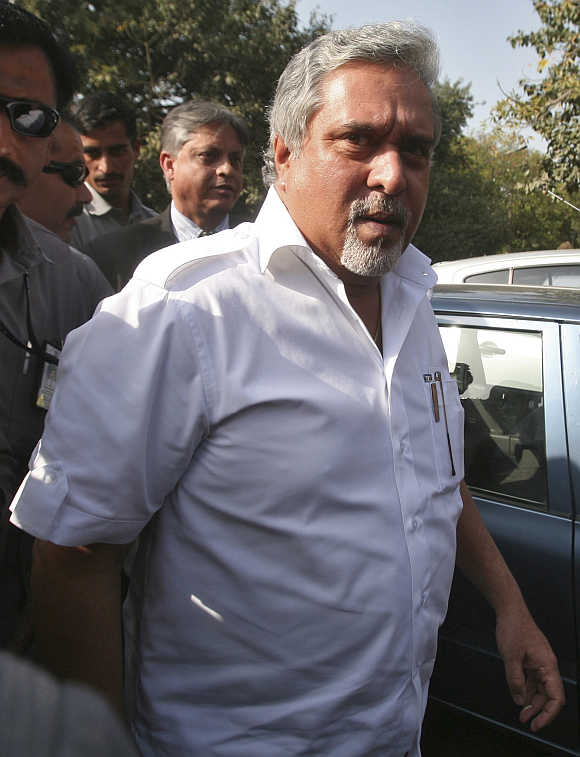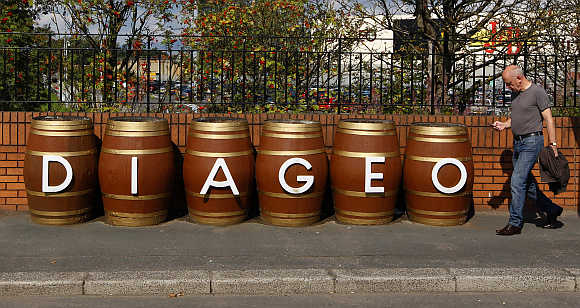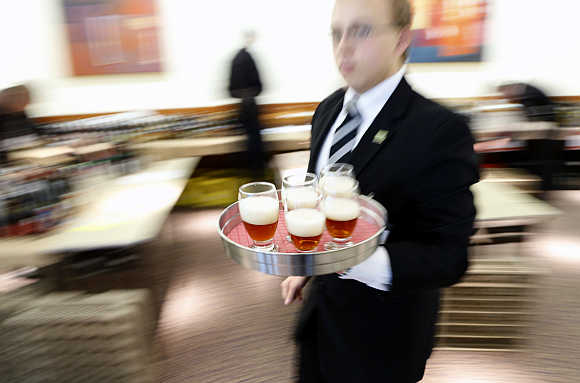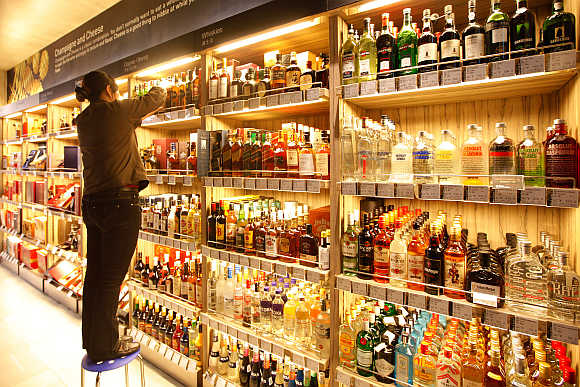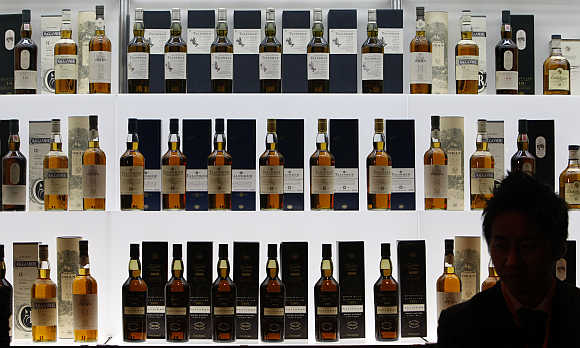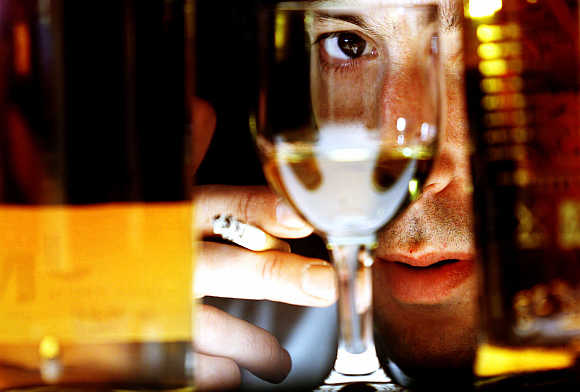 | « Back to article | Print this article |
What lies behind Chhabria-Mallya truce?
Those who track Vijay Mallya regularly got the first signal that he might want to sell United Spirits, perhaps to Diageo, last month when he settled his long-drawn legal battle with Kishore Chhabria, the chairman of Allied Blenders & Distillers.
No sensible buyer would put his money in a company bogged down with legal cases. Mallya has fought pitched battles with Chhabria, as well as his deceased older brother, Manohar Rajaram "Manu" Chhabria.
But, this settlement was arrived at without heated arguments in a court or public trading of charges. It was settled over a quiet (nay sober) meeting between the two liquor barons and a common friend - someone both men held in high regard.
It all started in late August when, embroiled in a string of legal hassles, some major and some routine, Chhabria decided that enough was enough and, through the reliable mutual friend, approached Mallya to sort out the pending legal issues.
"I proposed we should meet and settle it. It was not that my business was being affected, but there were some wrong perceptions among some investors about my company," Chhabria, 59, says.
With Kingfisher Airlines eroding his brand equity with each passing day, Mallya, too, might have been eager to settle outstanding issues with a rival against whom he was not making much headway on the legal front.
Click NEXT to read more...
What lies behind Chhabria-Mallya truce?
Mallya was also considering offloading a strategic stake in United Spirits to Diageo, and his keenness to untangle a few legal knots was more than evident. Mallya, on his part, has not yet shared his perspective on ending the issues with Chhabria.
Chhabria and Mallya met at the residence of the mutual friend, a prominent citizen of Mumbai. Among the three of them, a landmark agreement was drawn up to call off all issues hanging fire for over two decades.
"We hold this common friend of ours in high respect and he as well impressed upon us that it was time to settle issues," Chhabria says, explaining how the settlement was arrived at.
A few hours into the discussion, all issues between the two liquor tycoons were settled. Chhabria agreed to pay a token sum of Rs 8 crore (Rs 80 million) to Vijay Mallya to end the stand-off, thus freeing each of them to chart out his future strategic plans.
Manu and Chhabria had together acquired the Kolkata-headquartered Shaw Wallace in the 1980s. For the first few years, things were great between the brothers. Then, Manu accused his brother of walking away with BDA Distilleries, a Shaw Wallace subsidiary, surreptitiously. Chhabria, he alleged, had illegally transferred BDA shares to himself.
Click NEXT to read more...
What lies behind Chhabria-Mallya truce?
The distillery itself wasn't worth much but it owned a brand called Officer's Choice in which the Chhabria brothers had invested much money and effort. Chhabria, on his part, vehemently denied the charge.
As bitterness between the brothers grew, Chhabria partnered with former arch rival, Mallya. He got a stake in Mallya's Herbertsons (its flagship: Bagpiper whisky); and BDA, in return, became a subsidiary of that company.
Some years ago, the partnership between Mallya and Chhabria began to fall apart. Mallya alleged that Chhabria had, again on the quiet, started to buy shares of Herbertsons from the market.
As a result, his stake in the company was now dangerously close to Mallya's. For the first time, the spectre of losing a valuable brand like Bagpiper began to haunt Mallya. Legal cases followed. Meanwhile, Chhabria and Manu began to resolve their differences.
When Manu died in April 2002, 130 of the 160 legal cases they had filed against each other had been withdrawn. After Manu's death, his daughter, Komal Chhabria Wazir, was keen to run the Indian business, but her mother and sisters weren't.
Soon, the beer business got sold to SABMiller and the liquor business to Mallya. Along with all the assets (factories, brands, distribution network, etc), he also inherited those 30 unresolved cases.
Click NEXT to read more...
What lies behind Chhabria-Mallya truce?
Meanwhile, Officer's Choice began to grow briskly. Its spectacular growth into India's largest-selling whisky brand at 16 million cases, overtaking Mallya's Bagpiper, had sent shock waves through Mallya's United Breweries group.
Mallya swung into action and moved the Calcutta High Court seeking to restrain Chhabria from raising fresh resources until all the cases (with Shaw Wallace) were resolved.
The case dragged on for nearly a year before the warring parties decided to smoke the peace pipe. Chhabria, who is only involved in policy decisions of ABD now, has since given operational control to Deepak Roy, a veteran of the alcoholic beverages industry for three decades.
From a single product - Officer's Choice - ABD's product range now spans brandy, rum and vodka, not to mention a premium version of Officer's Choice.
"When I came on board five years ago, the balance sheet was weak and I had to protect the flagship, Officer's Choice, to keep the company afloat," says Roy, vice-chairman of ABD, who has had extensive stints with Mallya and Diageo earlier in his career.
A teetotaller with a five per cent stake in ABD, Roy has been given a free hand to run the company during the past five years. The results are there to see: ABD has grown at 30 per cent a year during the past five years and is expected to touch the Rs 1,800-crore (Rs 18 billion) revenue mark by the end of this financial year.
Click NEXT to read more...
What lies behind Chhabria-Mallya truce?
Some liquor industry insiders say Chhabria has been a one-brand (Officer's Choice) wonder. His Jolly Roger rum and Gorbatschow and Class 21 vodkas are yet to make a mark as they have recently entered the market.
Analysts say that Officer's Choice could soon begin to run out of steam because consumers are upgrading fast to the premium segment. So much so, the premium segment (Rs 500 per bottle and above) now accounts for over a third of the 260-million-cases-per-annum market.
Roy knows the market's changing. "In fact, while the popular segment, where Officer's Choice is present, will grow by around five per cent this financial year, the premium segment is growing by 18-20 per cent," he says.
To tap this segment and improve the profitability of ABD, Roy has built an extension of Officer's Choice in Officer's Choice Blue, a premium offering. This year, sales of Blue are expected to cross the million-case mark.
"We haven't yet gone pan-India with this (Officer's Choice Blue), as we are constrained by capacity. The settlement of all legal issues paves the way to expedite our fund-raising plans which will help us have our own distillery in western India and expand our base in the bottling units," Roy says.
ABD is charting a Rs 500-crore (Rs 5 billion) expansion plan and will raise around Rs 250 crore (Rs 2.5 billion) of this through the private equity route.
Click NEXT to read more...
What lies behind Chhabria-Mallya truce?
Hopes are that the resources can be raised during early financial year 2014. These will be employed in setting up distilleries, bottling units, besides investing in emerging brandy and rum brands.
This, perhaps explains why Chhabria was keen to resolve the legal cases with Mallya. Chhabria is readying the next generation to oversee the company from his family's perspective and vision. First son-in-law Jeetendra Hemdev has been learning the ropes from Roy for the past few years.
"Jeetu will be the face of the family in the company and may eventually be the face of the family on the board of ABD as and when I retire. Jeetu will not be running the day-to-day operations. The company will be run by professionals," Chhabria says.
However, his relationship with the family of his older brother, Manu, remains frosty. Even as speculation rages on whether Diageo will be a prominent player in the Indian market if it acquires a sizeable stake in United Spirits, Chhabria is pretty much clear that ABD will not get a strategic investor at this stage.
"We see tremendous value in ABD now, and over the next two years we can build in more value, following which we may explore such an option," he says.
Right now, in an industry shaken and stirred in equal measure over the past decade, Chhabria is set to dig in his heels.
